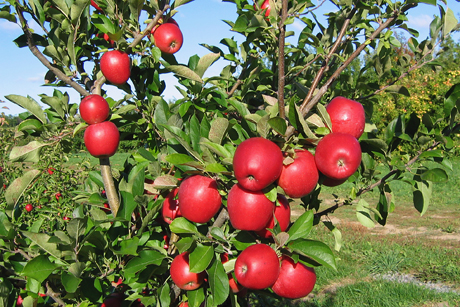- Apples are one of the healthiest foods a person can eat. They are high in fiber and vitamin C, and they are also low in calories, have only a trace of sodium, and no fat or cholesterol.
- Often called a “miracle food” and “nutritional powerhouse,” an apple a day really may keep the doctor away. Here are the nutrition facts from the U.S. Food and Drug Administration, which regulates food labeling through the National Labeling and Education Act.
Contents
Benefits
- Apples are loaded with vitamin C. Almost half of an apple’s vitamin C content is just under the skin, so it’s a good idea to eat apples with their skins. This is also where apples’ fiber is found. Apples contain insoluble fiber, which provides bulk in the intestinal tract. The bulk holds water that cleanses and moves food quickly through the digestive system.
- Regular intake of apples has been shown to have cardiovascular benefits. The fiber that they contain and the polyphenols that are found in high amounts.”
- In addition to digestion-aiding insoluble fiber, apples have soluble fiber, such as pectin. This nutrient helps prevent cholesterol from building up in the lining of blood vessels, which in turn helps prevent atherosclerosis and heart disease.
- All of these benefits mean that apples may mitigate the effects of asthma and Alzheimer’s disease, while assisting with weight management, bone health, pulmonary function and gastrointestinal protection.
- Apples may help reduce the risk of cancer, cardiovascular disease and diabetes. Polyphenols and antioxidants work in the cell lining to lower oxidation and helps reduce the chances of cardiovascular disease.
- Another study tracked food consumption among 9,208 people for 28 years. Those who ate more apples had a lower risk of stroke. Researchers attributed the results to quercetin, an antioxidant in apples.
- There are respiratory benefits to eating apples, as well. Apples’ antioxidant benefits can help lower the risk of asthma.
- Apples and cancer: The American Institute for Cancer Research recommends eating lots of fruits and vegetables, including apples. The antioxidant content of apples ranks among the highest for fruits, and research shows that antioxidants help prevent cancer. Lung cancer risk can especially be lowered through apples’ antioxidants. A study in Hawaii found that people who regularly eat apples, onions and white grapefruit cut their lung cancer risk in half.
Reference
Apples: Sharp, Tim; “Apples: Health Benefits, Risks & Nutrition Facts”, September 24, 2014 www.livescience.com/44686-apple-nutrition-facts.html

